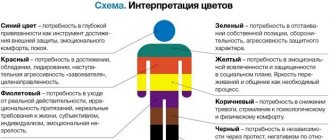Since ancient times, the greatest philosophers have tried to answer the questions: how can one objectively evaluate a person? What are the criteria for assessing personality? Which qualities are more important and which can be classified as secondary? Of course, we will never get an exact answer, because it is subjective and depends on goal setting. For some, a developed personality is one who strives for spirituality; for another, it is a creative person who creates something new every day; for a third, it is one who has unshakable principles and beliefs.
Subjectivity when assessing personality development criteria is obvious. One person can be said to be “the wild and reckless type” and at the same time “the funniest guy at the party.” Thousands of psychological tests, even when compiled according to all canons, can contradict each other.
So how do you assess personality? Testing and diagnostics must meet the following criteria: standardization, norms, reliability and validity. However, due to the incredible complexity in measurements, all this remains a theory, because a shade of subjectivity is still mixed into the assessment.
Concept by L. I. Bozhovich
From the point of view of the outstanding Soviet psychologist, student of Lev Vygotsky - L. I. Bozhovich, it is possible to identify two key criteria for a formed personality.
According to the first criterion, a person can be considered a person only if his motives are characterized by a certain hierarchy, that is, the person’s volitional efforts are sufficient to overcome some motives, giving preference to others. If a person has this quality, he is capable of indirect behavior. However, it is necessary to take into account that in case of indirect behavior, the motives with the help of which certain aspirations are given preference must be socially significant and justified, the very origin of these motives is socially conditioned, they are brought up in a person by society.
As the second necessary criterion for the formation of a personality, one must consider a person’s ability to consciously control his own behavior and manage it. This management is possible based on conscious motives-goals, beliefs and aspirations of the individual.
Too lazy to read?
Ask a question to the experts and get an answer within 15 minutes!
Ask a Question
The difference between the criteria is that the second presupposes a conscious subordination of motives. Only indirect behavior (without controlling motives; the first criterion) can be built on a spontaneously formed hierarchy of motives, that is, a person will not be aware of what exactly made him act in a certain way, but at the same time consider his behavior justified. So, although the second criterion also refers to mediated behavior, it is conscious mediation that is emphasized. It presupposes the presence of self-awareness as a special instance of personality.
Personality assessment criteria
If you are doing business or want to find worthy friends who you can rely on in difficult times, then you periodically ask yourself the following questions:
- What is most important when assessing a person?
- What are the most fundamental qualities in him?
Much depends on your goal setting, that is, what you consider important and valuable for yourself. For example, you may decide that the following criteria are important to you:
Temperament
This is a stable set of individual psychophysiological characteristics of a person associated with dynamic rather than meaningful aspects of activity. Temperament is closely related to character and has a strong influence on it.
Character
This is the structure of persistent, relatively permanent mental properties that determine the characteristics of relationships and behavior of an individual.
Socialization
Socialization means the ability to quickly and easily establish constructive relationships with others. A socialized person is more natural and open, but at the same time flexible, realistic and capable of resolving interpersonal conflicts.
Understanding others
A mature, formed personality is free from stereotypes and prejudices, capable of adequately assessing the surrounding reality and other people.
Such a person accepts people as they are, respects their originality and the right to be themselves.
Creative thinking
A very important quality of a developed personality is that she is able to face life's problems openly and flexibly, finding creative solutions to complex problems.
Mindfulness
This is a continuous monitoring of current experiences, that is, a state in which a person focuses on experiencing the present moment, without becoming involved in thoughts about past events or about the future.
A conscious person understands the consequences of his actions; he first thinks, then acts. She chooses her own reactions, what to feel, how to behave and how to think. Such freedom is achieved through prolonged mental exercise and reflection.
Integrity
This is internal harmony, when the physical, mental and spiritual-moral parts of life are inextricably linked. Integrity occurs when what you say, think and how you behave do not contradict each other. This is how a mentally healthy person should be.
Personal integrity is not given at birth, but is formed primarily under the influence of the external environment or in interaction with the external environment. It is achieved through enormous work on oneself, analysis of one’s psyche and self-reflection.
This does not mean that such a person is self-confident. He is aware of his shortcomings, but does not engage in flagellation, but methodically eradicates them. He develops his strengths and gets rid of his weaknesses.
G. Allport's concept
According to G. Allport, the components of the concept of a formed personality are its mental health, rationality and maturity. In accordance with this, the scientist proposes six main criteria for personality development.
- Expansion of the self-concept, which begins to form in preschool age and expands based on a person’s direct experience. A special role in the development of self-concept is played by the activity of the individual and the purposefulness of his activities.
- Strong social connections. A formed personality is able to realize itself as a participant in close relationships (marriage, friendship), can support them through conscious indirect behavior (that is, without giving preference only to unconscious motives of behavior that may be unacceptable for another person).
- Self-acceptance and tolerance towards others. A formed personality manifests its own beliefs and worldviews, taking into account the beliefs, interests and feelings of the people around them, and at the same time understanding that the views of others may differ significantly.
- Realistic perception, assessment of skills and task. A formed personality is able to focus on solving an objective problem, taking into account its own capabilities. The task at hand should relegate the satisfaction of secondary drives to the background. This criterion is directly related to responsibility - the existential ideal of a mature, formed personality. At the same time, the formed personality is in continuous interaction with the outside world.
- Self-objectification. A mature personality is able to “be herself” in any situation; she is in harmony with her inner world, without playing any other roles.
- Unity of ideological views. A formed personality has an idea of his life purpose. A mature personality has a relatively clear self-image. This criterion is associated with the “maturity” of conscience.
Definition
A formed conscience is a feeling of duty to maintain one’s self-image in an acceptable form, to continue one’s chosen line of proprietary aspirations, and to create one’s own style of being. Conscience is a type of self-government.
It is important to note that the process of personality formation does not stop in adulthood. Moreover, it never ends, but always has a conscious or unconscious goal. Thus, the concepts of “personality formation” and “adulthood” are not synonymous. Also, within the framework of one paradigm, the problem of personality formation can be considered as a relationship between different levels of human organization: individual, personality, subject of activity.
Personal growth
Personal growth is one of the dimensions of an individual’s psychological well-being. Subjectively, it is expressed by a feeling of continuous development, self-realization, and personal expansion. Personal growth is also revealed in a person’s increasing openness to the external and internal world, elements of new experience. Personal growth is associated with a feeling of increasing self-knowledge and self-improvement, and increasing effectiveness of oneself and one’s behavior. The process of personal growth is the opposite of states of boredom, apathy, depression, and stagnation.
Concept by A. A. Rean
Summarizing the most well-known theories, the focus of which is the psychological analysis of the main criteria for personality formation, A. A. Rean suggests considering four basic criteria:
- responsibility;
- tolerance;
- self-development;
- positive thinking (positive perception of the world).
The last criterion is integrative; it is realized not only independently, but also being present in all the others.
According to the concept of A. A. Rean, the formation of personality is not limited to gaining autonomy and independence in decision making. The statement that personality formation is a process that has no logical conclusion and never stops indicates the infinity and unlimited possibilities of personality self-actualization. According to the researcher, in the process of its development, a person overcomes a long path, which includes, firstly, the formation of the ability for self-determination, self-government, and the subordination of some motives of activity to others (more socially significant); secondly, the successful implementation of existing forces, inclinations and resources; thirdly, the ability to overcome the limitations of one’s own self and actively master more global and significant values.
The process of personality formation is influenced by a significant number of factors, which include individual (mainly biologically determined) and age-related characteristics of a person, qualitative and quantitative characteristics of relationships with people around him (including in the family), success in professional activity (or lack thereof) ) etc. Thus, the process of personality formation cannot be uniform, and therefore changes in the nature of relationships at certain stages of life are progressive.
INTRODUCTION
The relevance of the problem of personality is one of the central ones in psychology; according to one of the psychologists, the origins of man can only partially be understood and rationalized. The secret of personality, its uniqueness, is not fully understood by anyone. The human personality is more mysterious than the world. She is the whole world. It is important to understand and accept the peculiar principle of “unknowability to the end,” and this provision is especially significant in the practice of psychological assistance.
No one, not even the person himself, can fully understand and understand his personality. This state of uncertainty is the beginning of psychological help.
The purpose of this work is to study personality and its formation.
To achieve the goal, it is necessary to consider the following concepts in more depth:
— Personality
— Individual
— Individuality
— Criteria for a mature personality
— Personality structure and its orientation
— Personality formation
General ideas about the psyche
The psyche is a multifaceted construct that determines a person’s personality. There are several links in it:
- Mental processes. These are dynamic indicators that are criteria for understanding the world, help to take and analyze information from everything that surrounds a person, form his emotions in a specific episode of life, his behavior, goals and motives, and also regulate communication, depending on the situation, changing gestures and posture, volume and tone of voice, facial expressions. In the process of personality development, they constantly vary.
- Mental properties. Properties include:
- temperament, which is established at birth;
- character, which, when studying personality, also turned out to be largely dependent on the hereditary factor and only 10% on the external one;
- abilities that are both inherent in nature and formed during the development of the individual.
Properties are a static concept, but are subject to relative variation when exposed to a prolonged irritating factor.
- Mental states. Determines exactly which processes and properties of a person will manifest themselves in a given situation and which of them will prevail over others.
Bibliography
- Eysenck G.Yu. Personality structure / Transl. from English. - M.; St. Petersburg: KSP+; Yuventa, 1999. - 463 p.
- Albukhanova-Slavskaya K.A. The problem of personality in psychology // Psychological science in Russia of the twentieth century: problems of theory and history. - M.: IP RAS, 1997. - P.270-373.
- Antonova N.V. The problem of personal identity // Questions of psychology. - 1996. - No. 1.
- Antsyferova L.I. Personality in difficult life conditions: rethinking, transformation and psychological protection // Psychological Journal. - 1994. - T.15, No. 1. - P. 3-18.
- Antsyferova L.I. Psychology of everyday life, the life world of the individual and the “technique” of her existence // Psychological Journal. - 1993. - T.14, No. 2. - P. 8-17.
- Antsyferova L.I. Systematic approach to the study and formation of personality // Problems of personality psychology. - M., 1982.
- Aseev V.G. Motivation of behavior and personality formation. - M., 1976.
- Asmolov A.G. Personality as a subject of psychological research. - M.: Publishing house Moscow. University, 1984. - 104 p.
- Asmolov A.G. Personality psychology: principles of general psychological analysis. - M.: Smysl, 2001. - 416 p.
- Akhverdova O.A. Personality and behavioral disorders in children and adolescents with organic brain failure: Textbook. allowance / O.A. Akhverdova, I.V. Boev, N.N. Voloskova; Stavrop.state university. - Stavropol, 2000. - 273 p.
- Akhmerov R.A. Biographical personality crises: dis. ...cand. psychol. Sci. - M., 1994.
- Ball G.A. The concept of adaptation and its significance for personality psychology // Questions of psychology. - 1989. - No. 1.
- Batarshev A.V. Psychology of individual differences: From temperament to character and personality typology. - M.: Vlados, 2001. - 255 p.
- Batarshev A.V. Psychology of personality and communication. - M.: Vlados, 2004. - 246 p.
- Berezin F.B., Miroshnikov M.P., Rozhanets R.V. Methodology for multilateral personality research (in clinical medicine, in psychohygiene). - M.: Medicine, 1976. - 176 p.
- Berko D.V. The influence of parenting styles on the personal characteristics of girls: Author's abstract. dis. ...cand. psychol. Sci. - Stavropol: SSU, 2000. - 20 p.
- Bekhterev V.M. Selected works on personality psychology: In 2 volumes - Vol. 1: Psyche and life / Responsible editor: G.S. Nikiforov, L.A. Korostyleva. - St. Petersburg: Aletheya, 1999. - 256 p.
- Bekhterev V.M. Selected works on personality psychology: In 2 volumes - Volume 2: Objective study of personality / Responsible editor: G.S. Nikiforov, L.A. Korostyleva. - St. Petersburg: Aletheya, 1999. - 283 p.
- Bleikher V.M., Burlachuk L.F. Psychological diagnostics of intelligence and personality. - Kyiv: Vishcha School, 1984. - 142 p.
- Bodalev A.A. Personality and communication. - M., 1995. - 328 p.
- Boev I.V., Shurupov V.A. Personal and psychological characteristics of leaders at the municipal and regional levels in the modern period of Russia. - Stavropol: SSU, 2002. - 88 p.
- Bozhovich L.I. Personality and its formation in childhood. - M.: Education, 1968. - 464 p.
Attention!
If you need help writing a paper, we recommend turning to professionals. More than 70,000 authors are ready to help you right now. Free adjustments and improvements. Find out the cost of your work
Free estimate
0
Size: 34.33K
Downloads: 103
07.11.13 at 12:47 Author: DLife
Liked? Click on the button below. It's not difficult for you
, and we
are pleased
).
To download Abstracts for free at maximum speed, register or log in to the site.
Important! All presented Abstracts for free downloading are intended for drawing up a plan or basis for your own scientific works.
Friends! You have a unique opportunity to help students just like you! If our site helped you find the job you need, then you certainly understand how the job you add can make the work of others easier.
Add a job
If, in your opinion, the Abstract is of poor quality, or you have already seen this work, please let us know.










